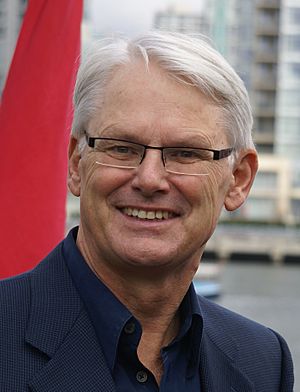Gordon Campbell facts for kids
Gordon Campbell is a name shared by several notable people. This page helps you find information about different individuals named Gordon Campbell.
Contents
Famous Gordon Campbells
Gordon Campbell: Canadian Politician
Gordon Campbell (born in 1948) is a well-known Canadian politician. He served as the 34th Premier of British Columbia, a large province in Canada, from 2001 to 2011. Before becoming Premier, he was the mayor of Vancouver, a major city in British Columbia, from 1986 to 1993.
As Premier, Gordon Campbell led the provincial government and made many important decisions for British Columbia. He was also Canada's High Commissioner to the United Kingdom from 2011 to 2016. A High Commissioner is like an ambassador, representing their country in another Commonwealth country.
Gordon Campbell (1886–1953) was a brave British admiral in the Royal Navy. He is famous for his actions during World War I. He received the Victoria Cross, which is the highest award for bravery in the British armed forces.
Campbell was known for commanding "Q-ships." These were disguised merchant ships that secretly carried powerful weapons. They were used to trick and sink German submarines (U-boats) that were attacking Allied shipping. His clever tactics helped protect many ships during the war. After his naval career, he also became a British politician.
Gordon Campbell: British Politician and Baron
Gordon Campbell, Baron Campbell of Croy (1921–2005), was another important British politician. He served as a Member of Parliament (MP) and held several government positions, including Secretary of State for Scotland. This role meant he was responsible for many aspects of governing Scotland. Later in his life, he was given the title of "Baron," which made him a member of the House of Lords, a part of the British Parliament.
Other Notable Gordon Campbells
- Gordon Campbell (cricketer) (1885–1961) was an Australian cricketer. Cricket is a popular sport, especially in Australia and other Commonwealth countries.
- Gordon Peter Campbell (1898–1964) was a Canadian senator, lawyer, and businessman. Senators are part of the Canadian Parliament, helping to make laws.
- Gordon Campbell (rugby league) (1906–?) was a New Zealand rugby league player. Rugby league is a team sport similar to rugby union.
- Gordon Campbell (scholar) (born 1944) is a British expert on the Renaissance, a period of great artistic and cultural growth in Europe.
- Gordon Campbell (businessman) was a former leader of Babcock International, a large engineering company.
- Gordon Campbell is a New Zealand journalist and editor of the website Scoop, which provides news and information.
- Gordon A. Campbell was a co-founder of Chips and Technologies, a company that made computer parts.
- Gordon Campbell is a trombonist who plays in the BBC Big Band, a famous British jazz orchestra.
 | Charles R. Drew |
 | Benjamin Banneker |
 | Jane C. Wright |
 | Roger Arliner Young |


